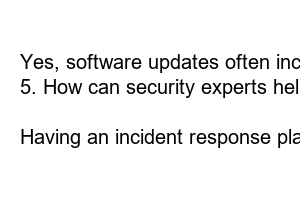세탁업 사이버 위생교육
Title: Cyber Hygiene Education in the Laundry Industry: Protecting Your Business in the Digital Age
Introduction:
In today’s digital world, the laundry industry is increasingly reliant on technology to streamline operations and enhance customer experience. However, with greater connectivity comes greater vulnerability to cyber threats. That’s why it’s essential for laundry businesses to prioritize cyber hygiene education to safeguard their operations, reputation, and customer data.
Subheadings:
1. Understanding the Importance of Cyber Hygiene in the Laundry Industry
With the increasing reliance on digital systems and networks, laundry businesses must prioritize cyber hygiene, which involves adopting security measures to prevent cyber threats and minimize risks.
2. Building a Cybersecurity Culture in Your Laundry Business
To effectively combat cyber threats, it is necessary to build a cybersecurity culture within your organization. **Empowering** employees with knowledge and training on best practices can go a long way in keeping your business secure.
3. Strengthening Password Practices for Enhanced Security
Passwords serve as the first line of defense against cyberattacks. **Implementing strong** password practices, such as using complex and unique passwords, can significantly reduce the risk of unauthorized access to your laundry business’s systems.
4. Securing Laundry Data and Customer Information
Laundry businesses handle a significant amount of sensitive customer data. **Employing robust** data protection measures, such as encryption and regular data backups, will help ensure the confidentiality and integrity of this information.
5. Educating Employees on Phishing and Social Engineering Attacks
Cybercriminals often use phishing and social engineering tactics to gain unauthorized access to sensitive data. **Training employees** to be vigilant in identifying and reporting suspicious emails or messages can help prevent successful attacks.
6. Regularly Updating Software and Patching Vulnerabilities
Hackers often exploit vulnerabilities in outdated software to gain access to systems. **Maintaining a strict** schedule for software updates and promptly patching vulnerabilities is crucial for keeping your laundry business secure.
7. Partnering with Security Experts for Comprehensive Protection
It’s wise to work with security experts who specialize in providing cybersecurity solutions for the laundry industry. **Leveraging their expertise** can help you stay ahead of evolving cyber threats and effectively protect your business.
Summary:
Cyber hygiene education is crucial for laundry businesses to safeguard their operations, customer data, and reputation in the digital age. By adopting strong security measures, creating a cybersecurity culture, and regularly updating software, businesses can significantly reduce the risk of cyber threats. Furthermore, educating employees on phishing, social engineering attacks, and partnering with security experts ensures comprehensive protection against evolving cyber risks. Stay proactive and invest in cyber hygiene to secure the future of your laundry business.
FAQs:
1. How does cyber hygiene education benefit my laundry business?
Cyber hygiene education helps protect your business from cyber threats, safeguard customer data, and maintain your reputation in an increasingly digital landscape.
2. What are some common cyber threats in the laundry industry?
Some common cyber threats include data breaches, ransomware attacks, phishing, and social engineering attempts.
3. How can I create a cybersecurity culture within my organization?
Encourage employees to actively participate in cybersecurity training, enforce strong password policies, and promote a culture of reporting suspicious activities.
4. Can software updates really make a difference in cybersecurity?
Yes, software updates often include security patches that address vulnerabilities exploited by hackers. Regular updates decrease the chance of successful cyberattacks.
5. How can security experts help my laundry business?
Security experts specialize in identifying vulnerabilities, implementing appropriate security measures, and staying updated on the latest cyber threats, ensuring comprehensive protection for your business.
6. What should I do in case of a cybersecurity incident?
Having an incident response plan in place is crucial. Contact your IT department or security expert immediately and follow their guidance on containing and mitigating the incident.

